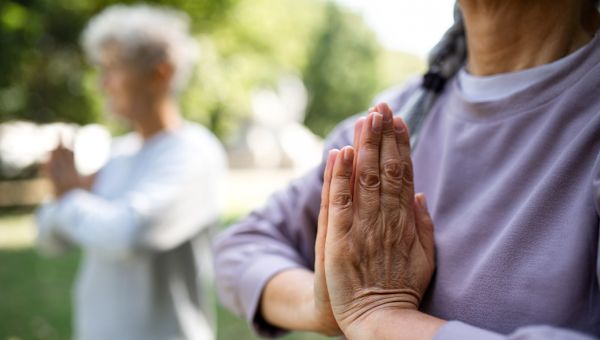Natural and home remedies for pain
Help relieve pain with self-care strategies like yoga, tai chi, meditation, and more.
Updated on December 6, 2024

We all experience acute pain from time to time, whether it’s from a broken bone or a toothache. Acute pain arises quickly from a known cause and goes away when the cause is remedied. It doesn’t last longer than three months. Chronic pain, or pain that lingers for at least three months, affects nearly 52 million adults in the United States, according to the Centers for Disease Control and Prevention.
If you’ve experienced either chronic or occasional (acute) pain, you know it often takes a multifaceted approach to take the edge off. That means employing several pain management techniques, rather than a single pain remedy.
It’s important to follow recommendations from your healthcare provider (HCP) when it comes to pain medication. But you may also want to explore other at-home approaches until you've developed a combined chronic pain treatment plan that really relieves your aches and pains. Here are seven options to try.

Heat or Ice
Heat and ice are used in different circumstances, and it’s important to choose carefully according to your needs.
Ice packs are generally used when there is an injury that’s caused tissue damage. The cold ice can help reduce swelling and inflammation, numb muscle and joint pain, and slow or reduce bleeding. Ice packs are usually used in the first 48 hours after an injury.
Heat should never be used right after an injury. It’s more helpful for stiffness in the joints, muscle spasms, and sore muscles caused by working out. Intense exercise can cause chemicals (like lactic acid) to build up in the muscles, which can make them ache. Applying heat, whether through a warm, moist towel or a heating pad, will stimulate blood to move to the area being heated. This extra blood flow can help eliminate the chemicals and ease any stiffness or spasms.
Not sure whether cold or heat is best for your muscle or joint pain? Check with your HCP.

Analgesics
Do you have muscle spasms, a soft-tissue injury, or osteoarthritis? Over-the-counter analgesic creams containing natural ingredients may be helpful. Arnica, an herb that has medicinal compounds, can help relieve osteoarthritis pain when applied in a gel form.
Menthol and methyl salicylate, when combined in a balm or salve, can help relieve pain from a variety of ailments, including muscle strains, sprains, aches, bruises, cramps, or arthritis. Since these are two of the main ingredients in mints like peppermint and wintergreen, salves made from those herbs may also be helpful.
Camphor also contains menthol and can help soothe your chronic pain. Always read ingredients lists carefully, and consult with your HCP before starting any new pain relief treatment. Even if it’s considered all-natural, it may not be safe for you and may interact with other medications.

Breathing Exercises
Deep-breathing exercises can not only help reduce the stress associated with chronic pain, but they may also help ease pain itself. You can use deep breathing as an emergency pain- or stress-reducing measure. Better yet, make it a daily ritual to see if it reduces pain levels and lifts your mood.
The technique revolves around using the diaphragm muscle to breathe slowly and smoothly. This can have a positive effect on the nervous system, which is involved in the perception of pain. When you’re stressed out, whether from pain or other stressors, it can cause you to breathe more shallowly, using muscles in your chest.
To try it, put one hand on your abdomen, and try to breathe so that your hand rises up when you take a breath (rather than your shoulders or chest). Next, try to take longer to breathe, counting to three as you breathe in, and counting to four as you breathe out. Only do what feels comfortable—if you feel lightheaded, breathe more gently.

Meditation
Can meditation relieve pain? For some types of chronic or recurring pain caused by fibromyalgia, low back pain, and rheumatoid arthritis, research has suggested that practicing mindfulness meditation may lower pain levels. It may also help relieve anxiety and other negative emotions about the pain. Other types of pain may be eased by mindfulness meditation, as well, but they may not have been studied as extensively yet. Meditation helps in part by lowering production of cortisol, the primary stress hormone, in the brain.
One way to practice mindfulness meditation is through a body scan exercise. Simply lay on your back, close your eyes, and practice diaphragmatic breathing, or breathing so that your belly rises when you breathe in and lowers when you breathe out. Then, beginning with your feet, start focusing on each area of your body and noting any sensations there. If there’s pain, acknowledge it and move to the next part of your body—your ankles. Continue until you’ve worked your way through your whole body.

Hypnosis
Hypnosis—or hypnotherapy—is an intentionally induced trance-like mental state thought to make a person more receptive to suggestion and helpful redirection. More than three-quarters of people with arthritis and similar conditions find that hypnosis helps with pain relief, according to the Arthritis Foundation.
Hypnosis seems to work by relaxing you and re-orienting your attention away from the pain sensation and toward something else. The hypnotherapist will help you focus on your breathing, or on thoughts of a pleasant place, such as a field of flowers or a calm lake. With the help of your imagination, the hypnotherapist will suggest that you will feel more at ease and less stressed about your pain.
Note that some people are less susceptible to hypnosis than others, so the technique isn't for everyone. If you want to try it for pain, seek the services of a trained and licensed hypnotherapist.

Talk therapy
Can how you think about your pain worsen or improve it? Maybe. Cognitive behavioral therapy (CBT) is a type of psychotherapy that encourages you to make healthy changes either in your behavior or thinking. It might involve learning techniques and practices like diaphragmatic breathing, mindfulness meditation, or yoga, which can help calm the nervous system. It may also involve learning to think about your pain differently and learning how to change how you respond to pain and stress triggers.
Research shows that people with chronic pain who undergo CBT may become more optimistic about their abilities to relieve, self-manage, and cope with their pain. If you want to explore this avenue, ask your HCP for a referral to a psychologist trained in CBT.

Tai chi and yoga
Two Eastern forms of meditative exercise—tai chi and yoga—are prized for enhancing strength, flexibility, and a calm spirit. Studies have revealed that both may also reduce pain and improve physical function in people with osteoarthritis, rheumatoid arthritis, fibromyalgia, and chronic lower-back pain. Beyond that, both disciplines may lower stress levels and boost overall quality of life in people with chronic pain.

Cleveland Clinic. Acute vs. Chronic Pain. Page last reviewed December 8, 2020.
National Center for Complementary and Integrative Health. Chronic Pain: What You Need To Know. Page last updated January 2023.
Centers for Disease Control and Prevention. Chronic Pain Among Adults — United States, 2019–2021. April 14, 2023.
Johns Hopkins Medicine. Ice Packs vs. Warm Compresses For Pain. Page accessed May 10, 2024.
MedlinePlus. Arnica. Page last reviewed December 11, 2023.
Mayo Clinic. Menthol and Methyl Salicylate (Topical Application Route). Page last updated February 1, 2024.
Cleveland Clinic. Camphor; Menthol Cream, Gel, or Lotion. Page accessed May 10, 2024.
U.S. Department of Veterans Affairs. Whole Health Library: Diaphragmatic Breathing to Assist with Self-Management of Pain. Page last updated May 1, 2024.
National Center for Complementary and Integrative Health. Complementary Health Approaches for Chronic Pain: What the Science Says. September 2022.
Mayo Clinic. Use mindfulness to cope with chronic pain. February 20, 2024.
Dubey A, Muley PA. Meditation: A Promising Approach for Alleviating Chronic Pain. Cureus. 2023 Nov 22;15(11):e49244.
Harvard Health Publishing. Mindfulness meditation to control pain. March 22, 2023.
Arthritis Foundation. Hypnosis for Pain Relief. Page accessed May 10, 2024.
Institute for Chronic Pain. What is Cognitive Behavioral Therapy for Pain? Page last updated June 15, 2022.
Centers for Disease Control and Prevention. Nonopioid Therapies. Page last reviewed November 3, 2022.
More On


video

article

slideshow


video


video
